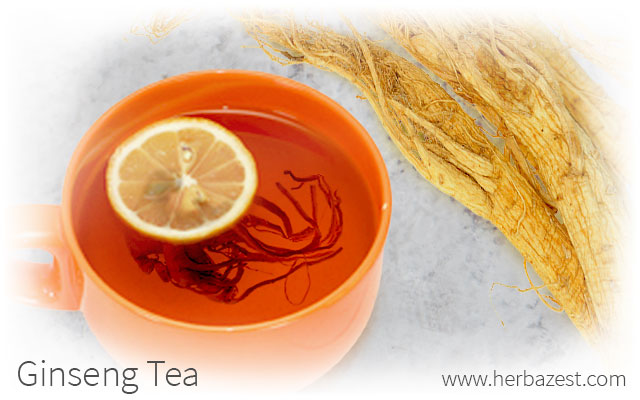The ginseng root has gained a worldwide reputation for its curative and preventative health benefits. One of the most popular ways to soak in the benefits is through ginseng tea. All types of ginseng can be used for this medicinal preparation. Whether it is with the warming and energy boosting Korean ginseng or with the cooling and immunoprotective American ginseng, learn how to make ginseng tea and fully reap its many benefits.
How to Make Ginseng Tea
To reap all of ginseng tea's benefits , you can use either fresh ginseng root or dried ginseng. Due to its strong taste, making tea is a very popular method of receiving ginseng's benefits. Here are some basic steps to help you brew the perfect ginseng tea.
Slice a fresh ginseng root with a potato peeler or a sharp knife, or cut dried ginseng root.
Bring a pot of water to a boil and turn off the heat.
Add one teaspoon of ginseng per cup of water or one tablespoon fresh ginseng leaves . Amounts can be adjusted to suit your taste.
Allow it to steep for 5 - 10 minutes, covered.
Strain the tea and pour into cups. Add honey or sweetener as desired.
The two main varieties of Panax - Korean ginseng (P. ginseng) and American or wild ginseng (P. quinquefolius) - can be made into tea for different effects. Korean ginseng tea is best in the cooler months because it is very warming and energy boosting, whereas wild ginseng tea is known for being more cooling, as well as for improving immunity.
Ginseng Tea Benefits
Ginseng tea has been proved extremely beneficial to improve memory, lower blood sugar, lower glucose levels, stimulate immunity, and ease a number of health conditions. Many of these ginseng health benefits are credited to ginsenosides, a special group of compounds formed from simple sugars and alcohol or phenol-type materials. Ginsenosides are exclusively found in ginseng and naturally occur in the whole plant, particularly in its rhizomes or roots, but also in ginseng berries.
Ginseng Tea Side Effects
Ginseng is considered to be a very safe herb, and while there are some possible adverse effects, they are minor and reversible. If a high dose of ginseng tea is taken, side effects - such as insomnia, headaches, and gastrointestinal problems - could occur. Following the recommended dosage of 0.5 - 2 g of ginseng root steeped into tea daily is the best way to prevent further ailments and maximize relief.
Ginseng has been a source of energy and nutrients for around 7,000 years and is still wildly popular today. In many parts of Asia, the tea form of ginseng is admired as a soothing, more appealing source of herb's benefits.
Sources
- American Family Physician, Panax ginseng, 2003
- NCCAM Herbs at a Glance, Asian Ginseng, 2012
- Phytochemistry, Ginsenosides from American ginseng: Chemical and pharmacological diversity, 2011




